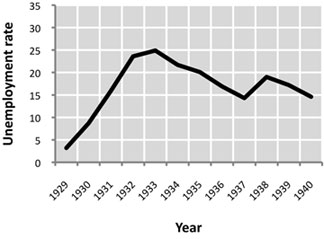In his article “New Deal Denialism” Eric Rauchway notes that rightists and leftists harbor conflicting viewpoints on the Great Depression: rightists argue that the New Deal was a jumble of ineffective socialist policies, while leftists retain that the New Deal did bring some degree of reform for Americans. But Rauchway argues that evidence from the time period does not directly support either contention, and thus in order to learn from the history of the Great Depression, the actual effectiveness of the FDR’s policies must be more closely examined. He relates this to modern attitudes about the 2008 Recession and possible a new era of depression, which I found to be a significant modern interpretation of New Deal history.
Firstly, Rauchway analyzes fluctuations in American GDP during the Great Depression. While the New Deal did not fully end the Great Depression without the aid of World War II, America’s GDP was steadily increasing throughout the 1930s, a sign that the country was very much on the road to recovery. Economic growth during New Deal years averaged to being between 8 and 10 percent; such numbers ought to be considered spectacular, given the state of the American economy in a severe recession.
Rauchway argues that New Deal policies did not fully pull America out of the recession during the 1930s due to the immense and unprecedented magnitude of the Great Depression, the likes of which had never before been seen. It is therefore possible that FDR’s New Deal policies did not allow for optimal recovery, although recovery did occur. An examination of the New Deal must therefore consider how Roosevelt could have adopted better policy, not whether he adopted any good policy at all.
In the 1930s, methods for measuring unemployment were much different from modern constructs. As such, using unemployment rates to analyze the New Deal is often a retrospective and deductive task, though not any less worthwhile. Although much data suggests steady improvement of unemployment levels during the New Deal, there is an inherent need, Rauchway argues, for artificial federal employment (such as through the CCC or other organizations) be separated from legitimate economic employment, such as private or farming activities. Even so, the unemployment situation appears much more favorable under FDR than under Hoover during the Depression’s early onset.

As unemployment is critical to determining GDP, to argue that the New Deal did not aid in American economic recovery would require making assumptions based on data generally agreed upon to be false, something that many conservative commentators had done after 2008 to protest imitations of FDR’s policies. I personally found this information very interesting because it ties largely into some of the economic ideas I’ve learned as well as historical processes, developments and interpretations.
Roosevelt’s policies during the Great Depression were certainly not perfect; many scholars agree that the onset of World War II saved his presidential legacy by turning the page on the Depression. His policies ought to have done more for minority groups and lower class citizens, as articulated in a previous post, and did not contribute to recovery as significantly as they perhaps should. However, it must be acknowledged that FDR’s administration, although demonized as being socialist at times, did take measures to lift America out of the Great Depression. Any analysis of the New Deal must take this into account when interpreting “what if” scenarios and articulating how the New Deal could have been better implemented to achieve its goal of American recovery and prosperity.
